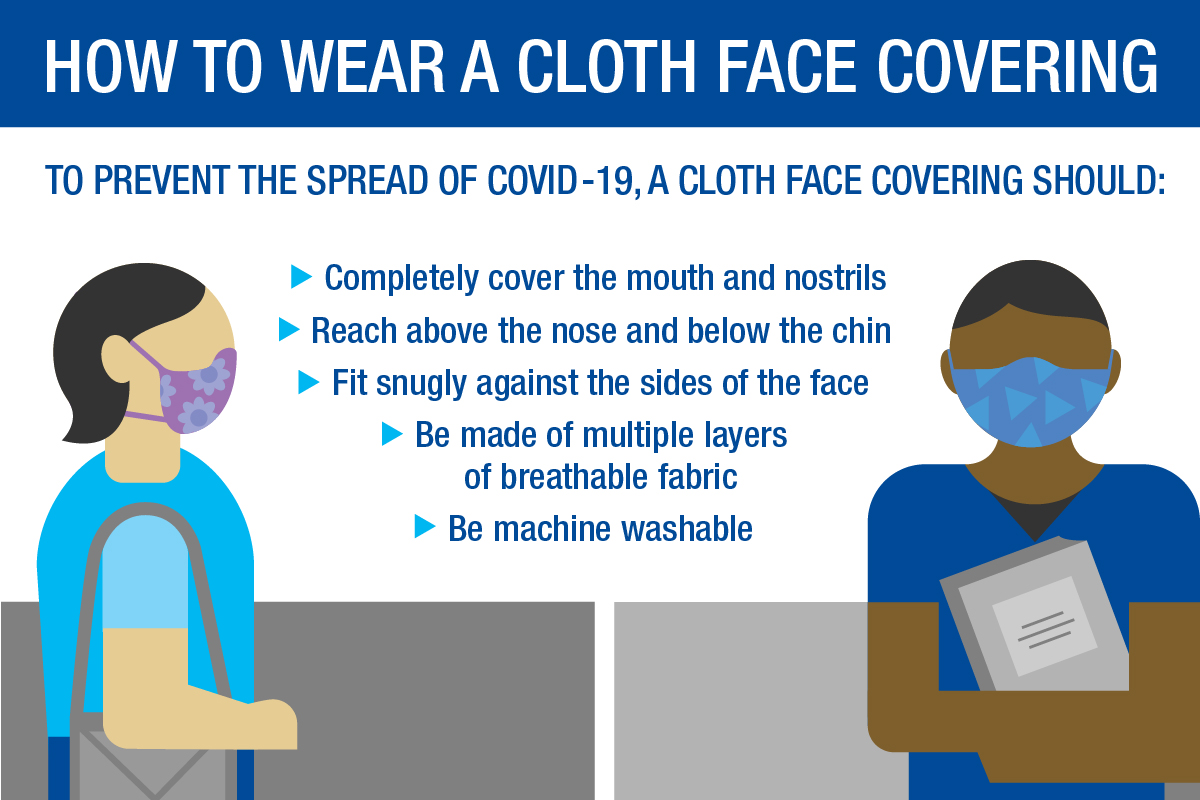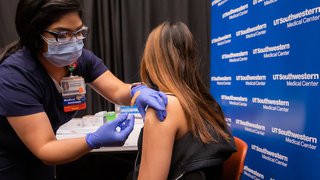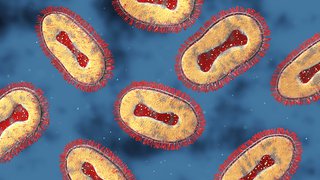Thanksgiving 2020: Tips for safe holiday travel and gatherings during COVID-19
November 13, 2020

With Thanksgiving fast approaching and December holidays not far behind, many of us are considering some difficult questions:
- Is it safe to travel during the COVID-19 pandemic, particularly as cases are rising?
- What about hosting a small gathering at home?
- Should we avoid seeing family and friends altogether this year?
Recently I joined Dr. John Warner, UT Southwestern's Executive Vice President for Health System Affairs, and Southwest Airlines’ Managing Director of Customer Experience Tony Roach to discuss these challenging choices on an episode of UTSW's weekly web series. “What to Know.” We also talked about ways that travelers can anticipate and navigate important changes to the holidays this year, such as:
- What to expect at the airport an on a plane if you’re flying
- How COVID-19 will likely affect gatherings and visits
- How you can protect yourself and your most vulnerable friends and family members
- And how to prepare for the most complicated travel and holidays seasons in recent memory.
Here are some of the most frequently asked questions we covered in the interview and our answers:
Dr. Warner: We’re all balancing our desire to see our families around the holidays with what’s safe and healthy. Dr. Perl, tell us what the science is saying that’s safe for us to do and what’s not safe to do.
Dr. Perl: Masks absolutely work. We also know that physical distancing works and that hand hygiene works, including alcohol-based hand gels. (The TSA is allowing travelers to bring hand sanitizer up to 12 ounces through security.) Those are all important. Additionally, we know that outdoors is safer than indoors, so if you’re going to have a gathering, being outside is better. Finally, serve the food so that there’s less sharing going on. Serving food “family style” is probably not what we want to do this year. Do everything you possibly can to protect people who are vulnerable – your grandmothers and the elderly in general. We have to really go out of our way to make sure we protect those individuals who we cherish so much.
Dr. Warner: Tony, many families are making decisions about travel, particularly air travel. Tell us a little bit about the practices at Southwest Airlines to keep customers safe during the pandemic and how those decisions might inform our decisions about travel.
Mr. Roach: There have been a couple things we’ve been doing to really make sure we’re playing our part to keep things as safe as possible. For one, we have a universal mask policy, both for employees and for customers, and we take that very seriously, including by making sure that folks who board the aircraft have the proper mask and that it’s well-secured. That’s been a big part of our strategy for keeping everyone safe. And then the aircraft is equipped with sophisticated systems and air filtration systems that play a big part in lowering risk. Those factors combined with other policies and procedures we have in place throughout the whole travel journey are creating a good, safe environment, both for employees and customers. There have been a lot of studies that show the risk of transmission on aircraft is very low.
Holiday Travel Advisory
Holiday traditions will be put to the test this year, as families try to find ways to safely celebrate together. Dr. Trish Perl, Chief of the Division of Infectious Diseases at UT Southwestern, and Tony Roach, Managing Director for Customer Experience at Southwest Airlines, offer practical strategies for travelers and important reminders for those staying home for the holidays.

Dr. Warner: Many people are asking about what to do when we’re seated with our family indoors. Should you wear a mask all the time except when you’re eating, or is sitting far apart good enough?
Dr. Perl: Mask up as much as possible, especially when you’re around relatives you don’t live with. For young children, another option is to wear a face shield – there are now face shields that are built into hats. It’s best to wear your mask and social distance.
Dr. Warner: Many people will be flying a plane for the first time in a while. What will be different for them when they enter the airplane and when they arrive at the airport?
Mr. Roach: You’ll see that there’s a lot more communication about maintaining physical distancing. You’ll see everybody wearing masks. There is a lot of cleaning going on throughout the day. There’s deep cleaning every night, and we’re cleaning between every single turn of the aircraft.
Dr. Warner: Dr. Perl, I know you’ve flown during the pandemic. Tell us how you’ve prepared.
Dr. Perl: I make sure that I have my bottle of alcohol-based hand gel. I wear a mask, and I also travel with a face shield. I just tell myself that it doesn’t matter what I look like on the airplane, and even if I look silly wearing my face shield, that it’s the best thing for me to be doing.
Dr. Warner: If people are not comfortable sitting in the middle seat or are worried about being on a full flight, do they have options?
Mr. Roach: Within three days of your trip, if you call us, we will let you know if your flight is forecasted to likely have middle seats occupied, and we will let you move to another flight that is less full at no additional charge. And that’s something that we put in place just for the flexibility of customers who just might not be comfortable. (These policies are specific to Southwest Airlines; policies vary based on the airline.)
Dr. Warner: What should families be thinking about regarding traveling to a hot zone or having people visit them from a hot zone?
Dr. Perl: This virus is so endemic that it’s not always where you’ve been as much as it’s about what you’ve done. If you’ve been in crowds, if you’ve been in a large group, if you’ve been anywhere near anyone who potentially has COVID, it’s really those activities that are the most important. Think about the activities that are going to put you at risk or that might put somebody who’s visiting you at risk, because those are the people who potentially have COVID and we just don’t know it yet.

UT Southwestern specialists offer key strategies for staying healthy during the 'perfect storm' of respiratory viruses this fall and winter.
Dr. Warner: What additional precautions should we be taking if we’re visiting or seeing a relative who is considered high risk for COVID-19 complications?
Dr. Perl: Get your flu shot. We know that flu will start circulating soon, so that’s important for those vulnerable relatives. If you have the luxury to quarantine for two weeks before you travel, it’s going to protect you and somebody who is more vulnerable. You certainly don’t want to take this illness to them. If you’re developing symptoms, please do not go into any kind of family event where you could potentially give someone either COVID or another respiratory tract infection.
Dr. Warner: Tony, what are three things you want travelers to be thinking about as they enter this holiday season?
Mr. Roach: First and foremost is to remember to bring your mask. You can go to our website and find out the details of the kinds of masks to bring. Number two, when you get on board the aircraft, turn on your air vent. It allows the airflow on the aircraft to be maximized and allows the air filtration system to work in its best state. And then the last thing, as already mentioned: Now is the time that if you’re not feeling well, we ask that you not travel, and just respect everybody else throughout the travel experience. Other than that, I would just remind everybody to expect a really good travel experience.
Dr. Warner: Dr. Perl, what are three things families should be thinking about as they prepare to travel or receive travelers during this holiday season?
Dr. Perl: Wipe things down in the house, especially what we call high-touch surfaces – places that a lot of people are touching. Just do that as frequently as possible. Think about strategies and ways to interact so that you can maintain social distances – about what you can do to serve people and have that gathering but also practice the best public health measures that you can. And then, finally, if you’re not feeling well, don’t travel and don’t see anyone who’s vulnerable.
For more information on COVID-19 and/or on traveling during the 2020-21 holiday season from UT Southwestern’s experts, please visit the MedBlog or utswmed.org/covid-19.











